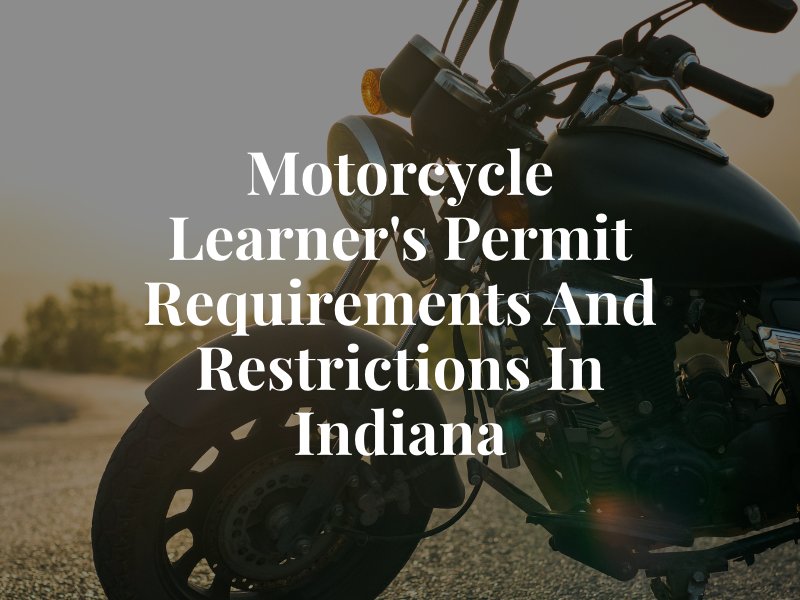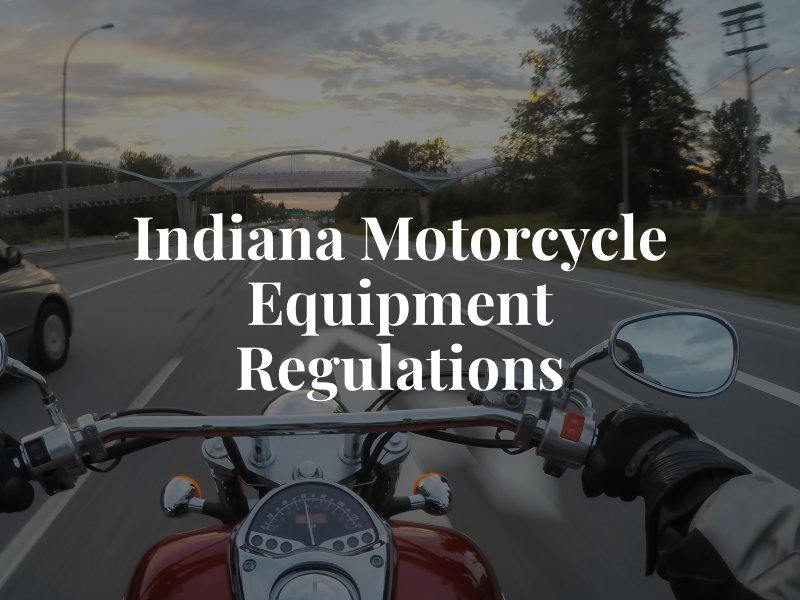Understanding Indiana motorcycle laws is essential for both safety and legal protection. These rules are in place to help keep riders, passengers, and everyone on the road safe. Even if you’ve been riding for years, there might be state-specific laws that you may not be fully aware of. By staying informed and compliant, you reduce your risk of a motorcycle accident and ensure that you’re legally covered if an issue arises.
Important Indiana Motorcycle Laws to Know
Motorcycle accidents can lead to serious consequences, which is why understanding motorcycle laws in Indiana is essential for all riders. Below is an overview of important regulations that motorcyclists should be aware of to stay compliant and safe on the road.

Your Case Will Get
The Attention It Deserves

Motorcycle Learner’s Permit Requirements in Indiana
To obtain a learner’s permit, applicants must pass a motorcycle knowledge exam and a vision screening. The permit is renewable one time only, so riders need to plan accordingly. Before the second permit expires, a motorcycle endorsement must be obtained, or applicants will need to wait a full year to reapply. An alternative option is to complete a Ride Safe Indiana safety course, which allows successful participants to earn their endorsement without additional testing.
Restrictions for Motorcycle Learner’s Permit Holders
Learner’s permit holders face specific restrictions while riding. They are required to have a valid driver’s license, wear a helmet that meets federal safety standards, and operate their motorcycle only during daylight hours. Carrying passengers is not allowed under the permit, and individuals with suspended or invalid driving privileges cannot apply for one.
Motorcycle learner’s permit – Sec. 3.
- (a) The bureau shall issue a motorcycle learner’s permit to an individual who meets the following conditions:
- (1) The individual holds a valid operator’s, chauffeur’s, public passenger chauffeur’s, or commercial driver’s license issued under this article.
- (2) The individual passes a written examination developed by the bureau concerning the safe operation of a motorcycle.
- (b) A motorcycle learner’s permit authorizes the permit’s holder to operate a motorcycle upon a highway during a period of one (1) year under the following conditions:
- (1) The holder wears a helmet that meets the standards established by the United States Department of Transportation under 49 CFR 571.218 as in effect January 1, 1979.
- (2) The motorcycle is operated only during daylight hours.
- (3) The motorcycle does not carry passengers other than the operator.


Motorcycle Endorsement in Indiana
Riders who are at least 16 years and 90 days old with a valid Indiana driver’s license can apply for a motorcycle endorsement. To qualify, they must either complete a state-approved motorcycle safety training course or pass both a knowledge exam and a skills test after first obtaining a learner’s permit. Riders under 18 must have a parent or guardian sign an Agreement of Financial Liability.
Section 3:
- (a) The bureau shall add a motorcycle endorsement to a driver’s license if the holder meets the following conditions:
- (1) Is at least:
- (A) sixteen (16) years and ninety (90) days of age and has completed a motorcycle operator safety education course approved by the bureau under IC 9-27-7; or
- (B) sixteen (16) years and two hundred seventy (270) days of age.
- (2) Makes a proper application in the form and manner prescribed by the bureau.
- (3) Has passed a written examination developed by the bureau concerning the safe operation of a motorcycle.
- (4) Satisfactorily completes an operational skills test at a location approved by the bureau.
- (1) Is at least:
- (b) The bureau may waive the testing requirements under subsection (a)(3) and (a)(4) for an individual who satisfactorily completes a motorcycle operator safety course approved by the bureau as set forth in IC 9-27-7.

Motorcycle Skills Exam Requirements
The skills exam is an important step for motorcyclists working toward a full license. Riders must provide their own motorcycle, sign a liability waiver, and demonstrate proficiency in tasks such as stopping, weaving, sharp turns, and obstacle avoidance. The exam takes place at authorized testing locations, and while fees may apply, riders are limited to one attempt per day. After three failed attempts, there is a mandatory waiting period of 2 months before retesting.
- (e) An individual may apply for a motorcycle endorsement not later than the expiration date of the permit. However, an individual who holds a learner’s permit and does not pass the operating skills examination after a third attempt is not eligible to take the examination until two (2) months after the date of the last failed examination.

Indiana Motorcycle Equipment Regulations
To ensure road safety, motorcycles in Indiana are required to meet certain equipment standards. This includes functional brakes, rear-view mirrors, turn signals, and a speedometer. Headlamps and rear reflectors must meet visibility guidelines, and must be used at all times while the motorcycle is being operated.
Headlamps shall be illuminated at all times when a motorcycle or motor driven cycle is in operation.
Additionally, handlebars cannot exceed 15 inches above the seat.
Handlebars, brakes, and mufflers.
- (a) Except as provided in subsection (b) of this section, a motorcycle operated on the streets or highways by a resident of the state must meet the following requirements:
- (1) Be equipped with handlebars that rise not more than 15 inches above the level of the driver’s seat or saddle, when occupied.
Riders under 18 and those operating with a learner’s permit are also required to wear a helmet and eye protection.
- A person less than 18 years of age who operates or rides a motorized bicycle on a street or highway shall do the following: (1) Wear protective headgear meeting the minimum standards set by the bureau or a helmet that meets the standards established by the United States Department of Transportation under 49 CFR 571.218 in effect January 1, 1979. (2) Wear protective glasses, goggles, or a transparent face shield.
Indiana Motorcycle Insurance Requirements
Motorcyclists must carry minimum liability insurance coverage, which includes $25,000 for bodily injury per person, $50,000 for bodily injury per accident, and $25,000 for property damage. Higher coverage is often recommended to provide added financial security in the event of an accident.
Other Motorcycle Laws in Indiana
Lane splitting, or riding between traffic lanes, is not permitted in Indiana. Motorcycles have the same rights to a full traffic lane as other vehicles, and riders should use this space responsibly to ensure their safety.
By familiarizing yourself with these laws, you can make informed decisions and reduce risks while riding.




